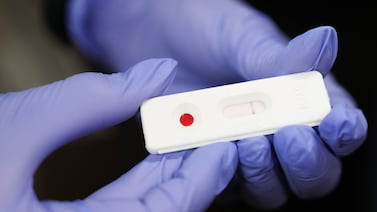Public health, explained: Sign up to receive Healthbeat’s free Atlanta newsletter here.
A research project at Emory University is among the 22 grants and contracts that are being cancelled as the U.S. Department of Health and Human Services begins a “coordinated wind-down” of research studying mRNA vaccine technology.
The grants, which were being developed under the Biomedical Advanced Research and Development Authority, amounted to nearly $500 million in funding to research projects. According to the agency website, researchers at Emory received $750,000 to develop an inhalable dry powder that could be used to immunize patients against influenza and SARS-CoV-2, the virus that causes Covid-19. Emory University did not respond to a request for comment.
Vaccines using mRNA were first developed by Pfizer-BioNTech and Moderna in response to the Covid-19 pandemic, and won a Nobel Prize in Physiology or Medicine in 2023. While traditional vaccines can take years to develop, mRNA vaccines can be developed much faster, and can be more quickly adapted in response to virus mutations.
However, U.S. Health Secretary Robert F. Kennedy Jr. — who has repeatedly questioned the safety and efficacy of vaccines and promoted widely debunked claims about vaccine harm — claimed that the Trump administration was terminating the grants because mRNA vaccines “fail to protect effectively against upper respiratory infections like Covid and flu.”
“We’re shifting that funding toward safer, broader vaccine platforms that remain effective even as viruses mutate,” he said in a Tuesday announcement. Research contracts with companies like Luminary Labs, ModeX Therapeutics, and CSL Seqirus are also being cancelled.
The most recent round of grant terminations comes on the heels of a nearly $600 million contract with Moderna aimed at developing a vaccine against bird flu that was cancelled by the Trump administration in May.
Public health experts, including state Rep. Michelle Au, a Johns Creek Democrat, condemned the decision to terminate the grants.
“Many preventable diseases will not, in fact, be prevented,” she said. “We will see the result of many chronic health conditions resulting from preventable disease, and those effects are going to last decades. This is a generational change in how we approach vaccine support and funding, not just in this country, but worldwide.”
Georgia’s current childhood vaccine rates are also far below the 95% rate needed to ensure herd immunity from measles, mumps and rubella, according to data from the Centers for Disease Control and Prevention. Only 88.4% of kindergarten students in Georgia received the MMR vaccine during the 2023-24 school year.
Au, who works as an anesthesiologist, also warned of the harm that could await future patients due to vaccine research cuts.
“We’re only starting to scratch the surface of the damage that we’re going to see,” she said. “When you stop research in its tracks like this, even if you say, ‘oh, maybe we’ll restore the cuts in the future,’ these are harms that will carry through even beyond what the immediate funding cuts generate.”
This story was originally published at Georgia Recorder.





